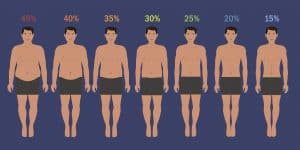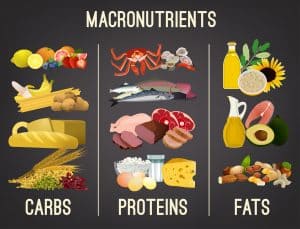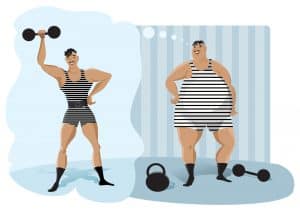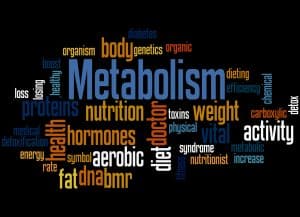So, You’re hitting the gym three times a week, and not obtaining the physique you wanted?
Your muscles weren’t bulking up as fast as you demanded and the stubborn fat isn’t moving?
Luckily—I discovered the power of hormones.
Here’s everything you need to know about hormones for muscle building and fat loss.
Anabolic vs. Catabolic Hormones
Before we look at the individual hormones themselves—it’s essential to recognize that there are two distinct forms—anabolic and catabolic.
Anabolic hormones metabolize small and simple molecules into much larger and more intricate forms. This leads to the building of organs and tissues. High levels of anabolic hormones are essential for the bodybuilder as they’re the driving force behind both bone and muscle growth.
Catabolic hormones have the opposite effect. They break down complex molecules such as tissues into smaller units such as fatty acids, monosaccharides and sugars. Usually, the body oxidizes them to release energy.
While you could view these catabolic hormones as the enemy of the bodybuilder (since they can prevent or inhibit muscle growth)—your body still requires them in limited concentrations for normal metabolic function.
Understanding the role of these hormones and having a healthy balance between the two forms can optimize muscle gain, elevate fat loss and prevent atrophy.
Bodybuilding Hormones for Muscle Growth and Fat Loss
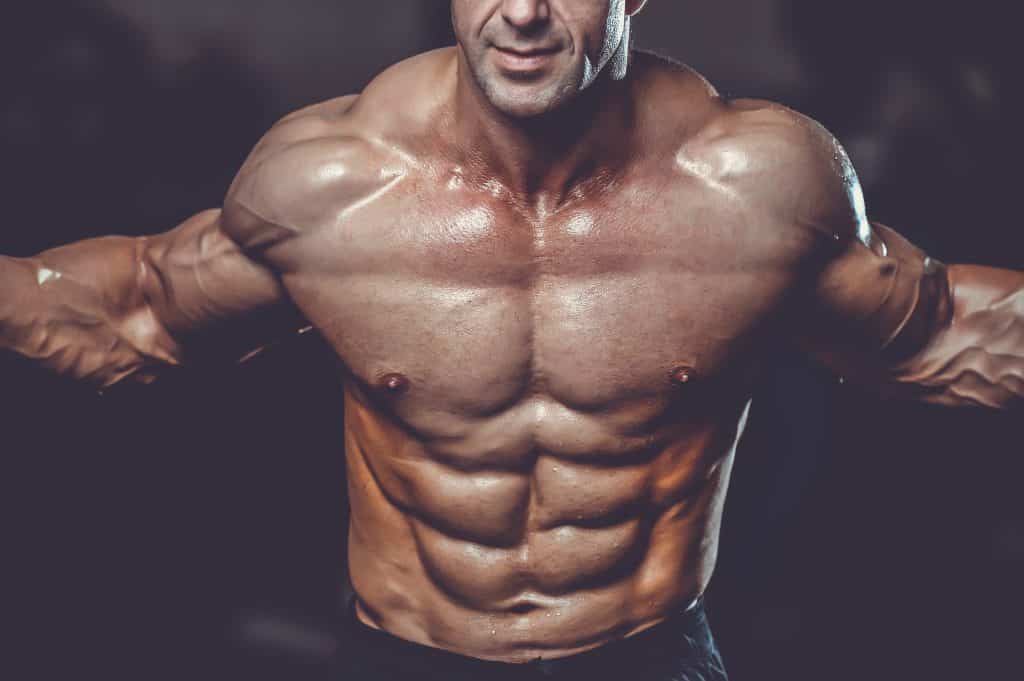
1
Testosterone
Possibly the most critical hormone in bodybuilding.
In guys, testosterone is mainly produced by the testes (in the Leydig cells)—although the adrenal glands also generate a small amount. In women, it’s formed in the ovaries.
Scientists class testosterone as both being an androgenic and anabolic hormone. As an androgen, it’s responsible for typically male characteristics—causing your penis to grow during puberty, giving you a deep voice and allowing you to sport an awesome beard.
The anabolic properties of testosterone mean that it promotes tissue growth—most importantly, the muscles. Studies show that this hormone is the driving force behind muscle protein synthesis.
Scientists and bodybuilders consider testosterone to be the original anabolic steroid—that on which all other synthetics derive from.
As an additional bonus—research shows that testosterone can assist with weight loss by promoting lipolysis (fat breakdown).
2
Growth Hormone
The reason that you’ve reached the statuesque height you are today—and not remained as a small child—is due to growth hormone.
The pituitary gland produces this vital compound.
While it’s height-boosting capabilities are effectively “switched-off” around the age of 18—this hormone continues to power cell, cartilage, and muscle and organ regeneration throughout your adult years. Thus, making it an essential anabolic hormone for the dedicated lifter.
Furthermore, growth hormone stimulates the production of IGF-1 (insulin-like growth factor 1)—a compound that heightens muscle protein synthesis and leads to impressive mass gains.
Finally, scientists explain that elevating growth hormone levels accelerates fat loss.
3
Insulin
Your pancreas produces insulin in response to food intake.
This anabolic hormone utilizes the glucose content of these staples and stores them as glycogen within the muscle cells. These reserves work as fuel depots—powering the body during resistance training.
Additionally, insulin is a transporter of amino acids. By increasing the delivery of these proteins to the muscles—it elevates the rate of muscle protein synthesis, boosting mass gains.
However, a quick word of warning.
While insulin is a potent anabolic hormone—heightened concentrations can promote fat storage.
4
Thyroid Hormones
While not directly anabolic—these hormones can influence your muscle growth and fat loss.
The thyroid gland in the neck releases three hormones—thyroxine (T4), triiodothyronine (T3) and calcitonin. These compounds are of interest to the bodybuilder because they:
- Elevate the metabolic rate—boosting energy levels and increasing fat burning rates.
- Increase heart strength, beating rate, physiological oxygen uptake and elevate blood flow—heightening stamina and power and leading to more productive workouts.
- Promote quality sleep—the time when the body produces the majority of testosterone and growth hormone.
- Encourage the synthesis of all amino acids (excluding citrulline and glycine)—which can accelerate muscle protein synthesis.
5
Estrogen
This female hormone, produced in men by the testes, is actually anabolic—despite what some guys down the gym will tell you.
Research illustrates that estrogen is essential for muscle protein synthesis and mass gain.
However, don’t reach for the female hormone pills just yet.
It’s essential that the testosterone to estrogen ratio remains in the male hormones’ favor.
If this female hormone takes control, it can lead to fat gain, water retention, gynecomastia and erectile dysfunction.
6
Ghrelin (Lenomorelin) and Leptin
Two different hormones—but which both affect your food intake.
Ghrelin is commonly known as the “hunger hormone.”
When your stomach is empty, the gastro-intestinal tract releases ghrelin. Conversely, when the stomach stretches, the release of ghrelin ceases.
This hormone stimulates the hypothalamic brain cells—invoking feelings of hunger and directing you towards the refrigerator.
Leptin, however, acts in the opposite way by inhibiting the desire for food. Research shows that both men and women who are overweight generally have a decreased sensitivity to this hormone.
Therefore, they are unable to detect when they are satiated.
Hence, lowering ghrelin levels and elevating leptin can help to boost fat loss. Scientists explain that the most natural way to do this is through exercise.
Catabolic Hormones
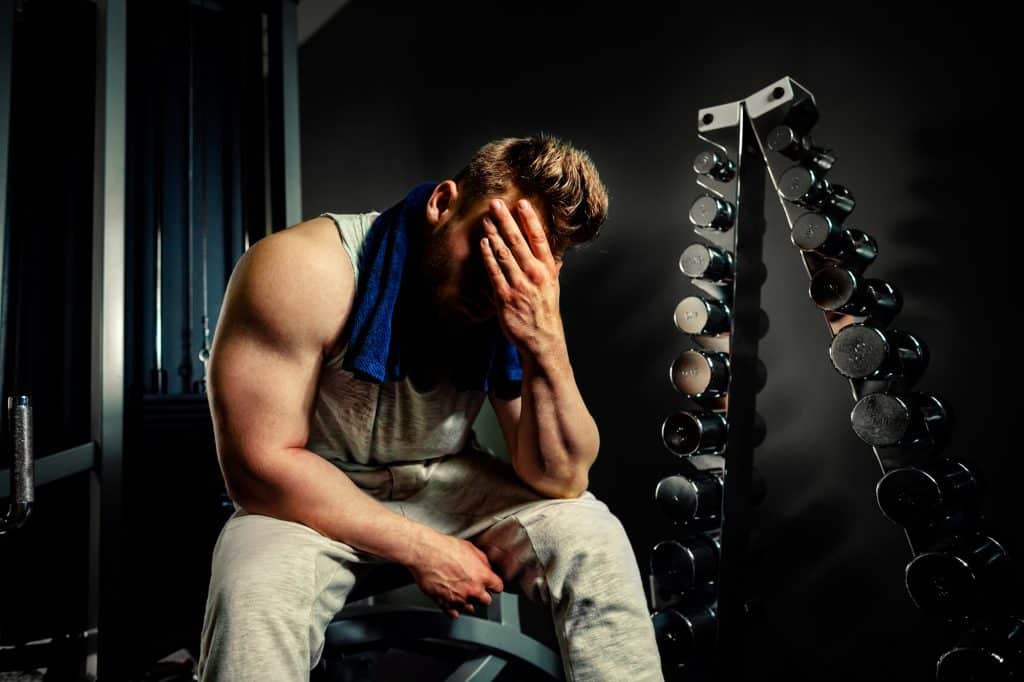
1
Cortisol
Some experts consider cortisol to be the most catabolic of all hormones.
Generally speaking, your body releases this compound under two circumstances—when you’re experiencing stress, and when blood glucose levels fall too low.
In both cases, cortisol begins to convert amino acids into glucose for energy. This means they cannot be utilized for muscle protein synthesis—preventing mass increases.
2
Adrenaline (Epinephrine)
The adrenal glands and the medulla oblongata (in the brain) release this compound.
Known as the “fight or flight” hormone—the body produces adrenaline when the body is under stress. It has the effect of boosting the amount of blood flow to muscles, increasing heart rate, raising oxygen uptake and elevating blood sugar levels.
Hence, during exercise, high-levels of adrenaline are theoretically desirable. The improvements in pulmonary and cardiovascular action will increase stamina and endurance—promoting more rewarding workouts and elevating fat loss.
Furthermore, exercise itself can be considered a precursor to adrenaline—the more you train, the higher your adrenaline levels.
However, it’s not all good news.
Adrenaline is essentially catabolic. In the search for plentiful and rapid energy sources (to help you either fight or run away)—this hormone breaks down both glucose and energy stores in the muscles. Thus depriving them of the building blocks for mass gains.
3
Glucagon
This hormone, secreted by the pancreas, stimulates the production of glucose in the liver when current blood sugar levels are too low.
While research shows that this has a positive effect on lipolysis (fat loss), it can have damaging consequences for the weightlifter.
It inhibits protein synthesis—negating the hard work put in during resistance training sessions and preventing size increases.
Can You Boost Your Growth Hormones and Testosterone Naturally?
As both growth hormone and testosterone possess potent anabolic powers—it’s no surprise that some guys have followed the dubious route of steroid use.
While the introduction of these exogenous hormones results in fast and enormous muscle growth—they can come with the side effects of:
- Gynecomastia (man-breasts).
- Enlarging of the heart.
- Hair loss.
- Testicular atrophy (shrinking balls).
What’s more—they’re illegal.
However, it’s possible to elevate your body’s production of these potent compounds naturally—and without adverse health issues.
Naturally Elevating Growth Hormone
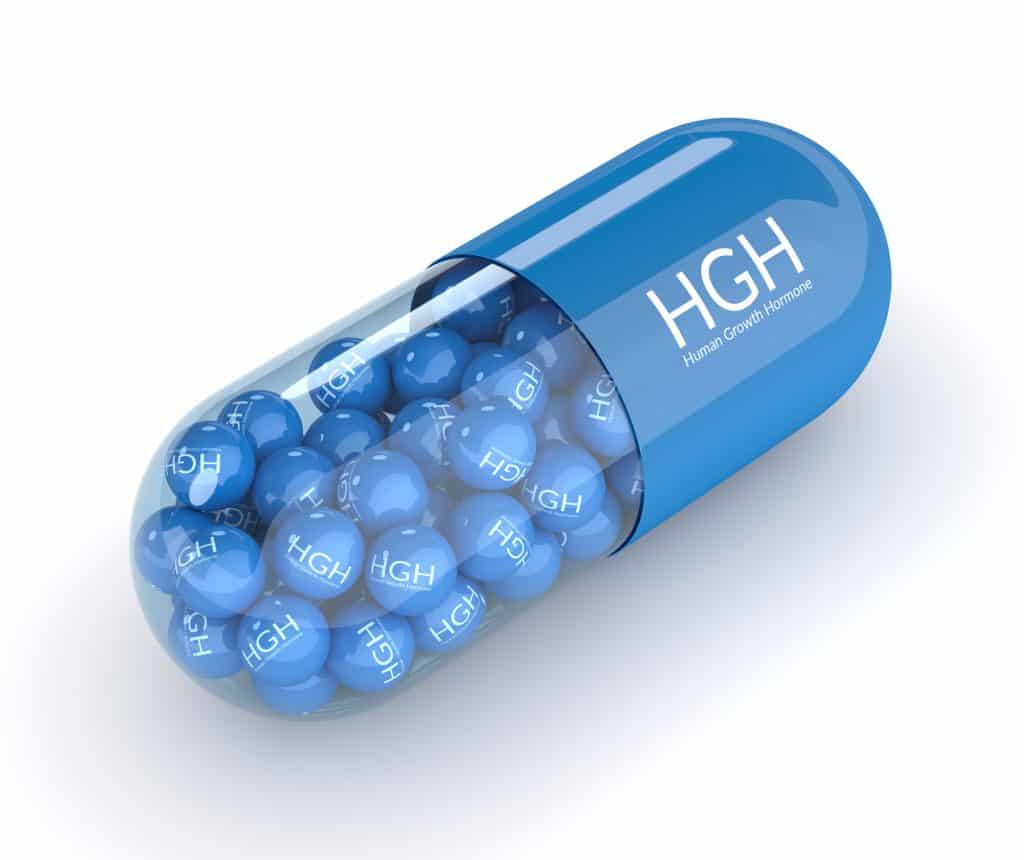
Drop the Excess Pounds
Studies explain that men with high levels of body fat exhibit signs of impaired growth hormone production.
So—exercise. Not only will this help to drop excess pounds, but also research shows it stimulates growth hormone secretion.
Intermittent Fasting
Scientists have shown that going without food can lead to massive growth hormone boosts.
One study, which investigated the effect of fasting on growth hormone, illustrated that just 48 hours of food deprivation led to a five-fold increase in the muscle-building compound.
However, extended fasting is neither healthy nor conducive to an efficient training regime.
Instead, increasingly popular is intermittent fasting to raise growth hormone levels. Two of the most common are the 5-2 diet (five days of typical food consumption, two days restricted intake) and the 16-8 (16 hours fasting, 8 hours eating window).
Supplementation
I’m not talking about ingesting growth hormone itself—that’s both dangerous and illegal without a prescription.
There are numerous and effective specific growth hormone boosting products on the market—which contain a multitude of ingredients that aim to stimulate the body’s natural secretion of this hormone.
Alternatively, a number of sole-compound supplements are scientifically proven to elevate your body’s natural stores.
- Arginine—research shows that ingesting 1.5 grams of arginine heightens growth hormone—without exercise.
- GABA (gamma-aminobutyric acid)—studies demonstrate that consuming three grams of GABA increases growth hormone formation by 400 percent while at rest and by 200 percent post-exercise.
- Beta-alanine—not only can this compound increase stamina and endurance during training, but scientists also explain that it heightens growth hormone secretion.
Melatonin—this hormone both increases sleep quality (when your body produces the majority of growth hormone) and directly elevates the production of this anabolic compound.
Train Slowly
Recent clinical studies indicate that the way you train can affect the production of growth hormone.
During the eccentric phase of weightlifting (where you lower the weight, and the muscles extend)—the longer you take, the more growth hormone your body produces.
Guys who took three seconds to lower weights secreted 17 times more growth hormone than those who took one second.
Naturally Elevating Testosterone
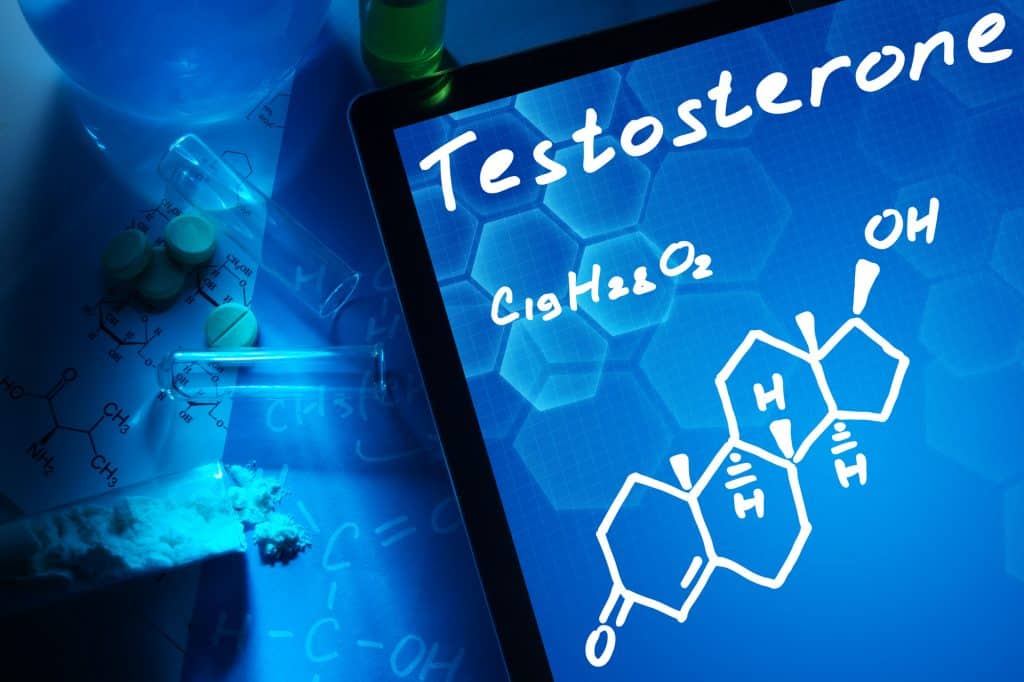
Utilize a Testosterone Boosting Workout
Science shows that exercise, specifically resistance training, increases testosterone production.
Additionally, working out in a specific manner can maximize the creation of this potent natural steroid. Researchers explain that for the ultimate T-boost, your training should follow these three rules:
- Concentrate on larger muscle groups—ignore isolated exercises, instead utilize compound movements such as deadlifts and squats.
- Use the heavy iron—work on an absolute maximum of six reps for six sets.
- Reduce rest time—don’t have a break for longer than one minute between each individual set.
The key is to push your body to the absolute limit—the more stress you place upon it, the more significant the testosterone returns.
Use Supplements
Nature has its own supply of scientifically proven testosterone boosters—you don’t need synthetic steroids. Some of the most effective include:
- Vitamin D—experts explain that supplementing with this vitamin can heighten testosterone production—even going out in the sunshine can raise your reserves.
- Zinc—a mineral that can boost sperm production and elevate T-stores.
- Ashwagandha—an herb which science shows heightens testosterone production by 15 percent.
Alternatively, testosterone boosting supplements are available which contain numerous compounds, including those mentioned above, to address multiple methods of T-production.
Lower Your Stress Levels
As we have seen, when the body is under stress, it produces the catabolic hormone cortisol.
Not only can this hormone prevent or inhibit muscle protein synthesis, but research also shows it has a detrimental effect on testosterone.
Cortisol acts by suppressing your body’s natural ability to produce testosterone—lowering stamina, strength and muscle gain.
Sleep
Your testes produce testosterone during sleep, particularly during the REM (rapid-eye movement) stage.
Insufficient slumber, or poor quality sleep, impedes T-creation.
One study examined the effects of sleep deprivation on men in their 20s. It proved that when slumber was reduced from eight hours to just four—the subjects exhibited a 15 percent reduction in testosterone levels.
The Hormone Controversy
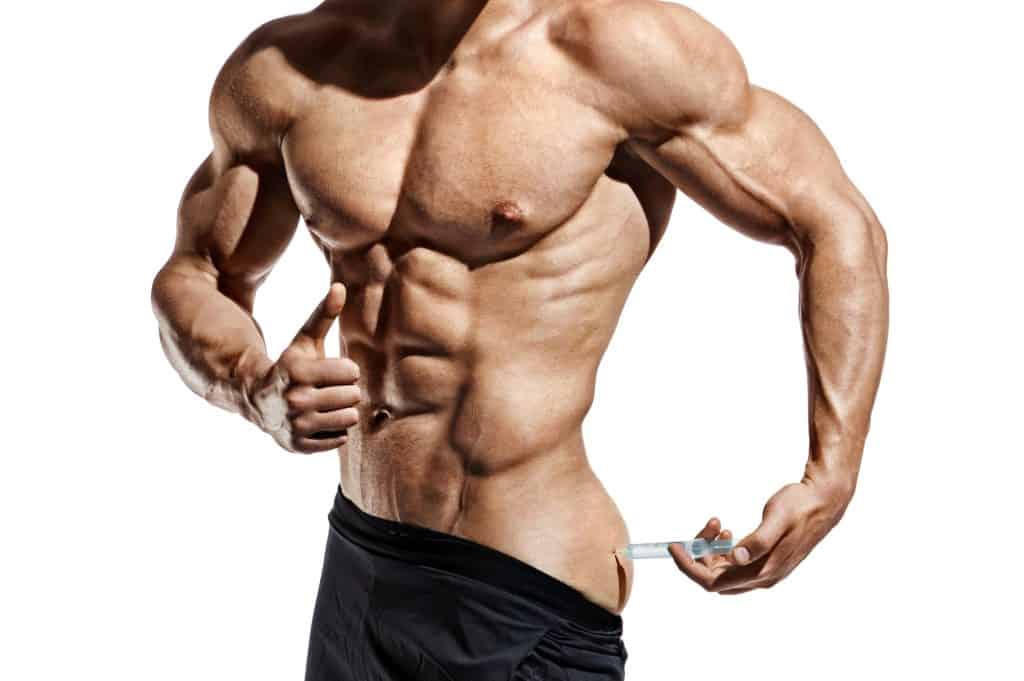
It’s an unquestionable truism that hormones boost muscle growth. For nearly 50 years, guys (rightly or wrongly) using steroids have enjoyed gains that they couldn’t achieve through exercise and diet alone.
However, one particular feature of their muscle enhancing power has recently been called into question.
Exercise, especially resistance training, increases hormone production—in particular testosterone and growth hormone. Many fitness trainers and bodybuilders believe that this exercise-based surge enhanced the speed and size of muscle growth.
Yet, recent research suggests that it’s not the concentration of hormone production that’s important—as opposed to how sensitive your muscles are to hormone signals.
Over the last ten years, researchers at McMaster University examined post-workout hormone levels against muscle growth. They discovered that there appears to be no correlation.
Instead, they found that those men who made the most substantial gains had a high proliferation of androgen receptors in their muscles. That is, a protein “switch” which turns muscle growth on and off.
While evidential—this study is at odds with numerous previous studies that illustrated exercise-induced hormonal changes did indeed benefit muscle gain.
The Takeaway
Building muscle and dropping excess weight isn’t just about training.
Ensuring that your hormone levels are at optimum can enable you to obtain a ripped physique at an accelerated pace.
By modifying your training, watching what you eat, supplementing and lowering stress—you can maximize your hormone health—without re-coursing to illegal synthetics.








